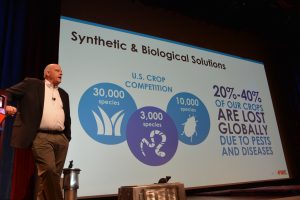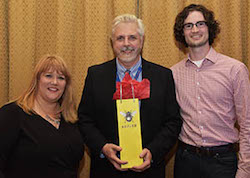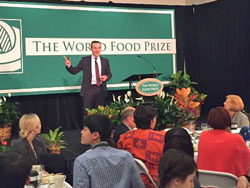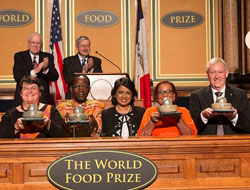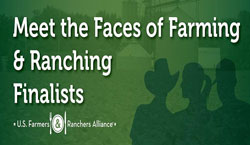
 Top farming organizations joined together urging food companies to recognize that their sustainability goals, intended to reduce the use of natural resources, cannot be achieved without the use of modern agricultural practices, despite any misleading assertions to the contrary.
Top farming organizations joined together urging food companies to recognize that their sustainability goals, intended to reduce the use of natural resources, cannot be achieved without the use of modern agricultural practices, despite any misleading assertions to the contrary.
This focus on deceptive food company marketing claims is in response to Dannon’s recent pledge to eliminate the use of safe and proven crop technology to feed the dairy cows that supply milk for its yogurt products. Dannon is one of several prominent food manufacturers and retailers that in recent years has taken steps to eliminate genetically-modified ingredients from its supply, claiming that such a move improves the sustainability of its products.
In a letter sent to Mariano Lozano, head of Dannon’s U.S. operations, the farm groups said that the company’s strategy to eliminate GMOs “is the exact opposite of the sustainable agriculture that you claim to be seeking. Your pledge would force farmers to abandon safe, sustainable farming practices that have enhanced farm productivity over the last 20 years while greatly reducing the carbon footprint of American agriculture.”

 “This is just marketing puffery, not any true innovation that improves the actual product offered to consumers,” said Randy Mooney, chairman of the National Milk Producers Federation, and a dairy farmer from Rogersville, Missouri. “What’s worse is that removing GMOs from the equation is harmful to the environment – the opposite of what these companies claim to be attempting to achieve.”
“This is just marketing puffery, not any true innovation that improves the actual product offered to consumers,” said Randy Mooney, chairman of the National Milk Producers Federation, and a dairy farmer from Rogersville, Missouri. “What’s worse is that removing GMOs from the equation is harmful to the environment – the opposite of what these companies claim to be attempting to achieve.”
The letter was cosigned by the farmer leaders of the American Farm Bureau Federation, American Soybean Association, American Sugarbeet Growers Association, National Corn Growers Association, National Milk Producers Federation and U.S. Farmers and Ranchers Alliance. Collectively, the six organizations represent hundreds of thousands of farmers and food producers across the U.S.
“Farming organizations are standing up for the technology that supports continuous improvement in farm sustainability. Farmers and ranchers have grown GMO crops over the past 20 years precisely because biotechnology helps farmers preserve resources for the future,” said Nancy Kavazanjian, chairwoman of U.S. Farmers and Ranchers Alliance (USFRA), and a corn, soybean and wheat farmer in Beaver Dam, Wisconsin. “When food companies are making sourcing decisions, farm groups encourage them to recognize that modern, conventional agriculture is sustainable.”

 Numerous, conclusive studies have come out over the last 20 years proving the safety of GMO food and the environmental benefits of growing GM crops. Most recently, 109 Nobel laureates announced their support of GMO technology, citing a study from the National Academies of Sciences, Engineering and Medicine saying, “the study committee found no substantiated evidence of a difference in risks to human health between current commercially available genetically engineered (GE) crops and conventionally bred crops, nor did it find conclusive cause-and-effect evidence of environmental problems from the GE crops.”
Numerous, conclusive studies have come out over the last 20 years proving the safety of GMO food and the environmental benefits of growing GM crops. Most recently, 109 Nobel laureates announced their support of GMO technology, citing a study from the National Academies of Sciences, Engineering and Medicine saying, “the study committee found no substantiated evidence of a difference in risks to human health between current commercially available genetically engineered (GE) crops and conventionally bred crops, nor did it find conclusive cause-and-effect evidence of environmental problems from the GE crops.”
“Despite overwhelming evidence supporting the safety GMO crops and their benefits to the environment, marketers of some major food brands, such as Dannon, have aligned themselves against biotechnology,” said Wesley Spurlock, President of the National Corn Growers Association. “Farming organizations believe in open and honest communication with consumers, and allowing people to make informed choices in the market. But we cannot sit by while certain food companies spread misinformation under the guise of a marketing campaign.”
 Our latest ZimmPoll asked the question, “Will you be getting the new iPhone 7?”
Our latest ZimmPoll asked the question, “Will you be getting the new iPhone 7?”

